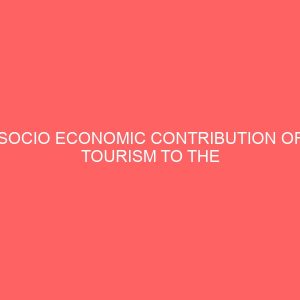Description
PROSPECTS AND PROBLEMS OF E-MARKETING IN THE HOSPITALITY INDUSTRY
CHAPTER ONE
INTRODUCTION
1.1 BACKGROUND OF THE STUDY
According to the definition provided by the American Marketing Association (2008), marketing refers to “an organizational function and a set of processes for creating, communicating, and delivering value to customers and for managing customer relationships in ways that benefit the organization and its stakeholders. In essence, marketing is a consumer-oriented philosophy or way of doing business; companies that are consumer oriented will put consumers’ needs and wants on their top priority. From this perspective, the ultimate goal of marketing is therefore to create and retain profitable customers by satisfying their demands. It is worth noting that the goal of retaining profitable customers is particularly challenging in Asia including Hong Kong. This is because people in this region tend to be more group oriented and the word-of-mouth effects are especially strong.
Hospitality marketing is unique because it deals with the tangible product, like a bed in the hotel or food in the restaurant, but it also deals with the intangible aspects of the hospitality and tourism industry. It is about the experience in a trip and social status it brings eating in a fine-dining restaurant. Hospitality marketing is very critical in the success of any hospitality and tourism product, organization and tourist destination. Proper marketing effort promotes a product or service that fills the needs and wants of the consumers and at the same time, bring profits to the organization or country that features it.
E-marketing is any marketing done online via websites or other online tools and resources. eMarketing can include paid services while other methods are virtually free. A wide variety of eMarketing methods are at your disposal, including: direct email, SMS/text messaging, blogs, webpages, banners, videos, images, ads, social media, search engines, and much, much more.
1.2 STATEMENT OF THE PROBLEM
It has been emphasized that the immense contribution of internet towards the development of the hospitality industry and the country as a whole is enormous and that organizations from all over the world now depend almost on the use of internet (ICT) to manage and market their services. Therefore those who have not as yet adopted ICT in their operations to take a critical look at it.
The contribution of the hospitality industry to the overall growth of the economy of Nigeria cannot be overemphasized. For the hospitality industry to succeed, the need for efficient and responsive hotel subsector which incorporates modern trend of business and customer service cannot be ignored. The efficiency and smart services provided attributable to e-business present a bigger opportunity to firms, industry and the country as a whole necessitating the availability of knowledge through research.
Scepticism about e-marketing has always been a barrier to reaping the benefits inherent in its adoption especially in the developing countries where information and communication technology (ICT) is yet to see its best days.
To many businesses, the use of its existing structures, systems and methods help managers and operators remain in their comfort zone without many challenges. E-business however presents a more contrasting option and its adoption brings more benefits and provides global competitiveness for modern business.
1.3 OBJECTIVES OF THE STUDY
The objectives of the study are to find out the following:
1. To identify the benefits of e-business to the hospitality industry in Nigeria.
2. To determine the whether e-marketing bring challenges to customers’ of the hospitality and tourism industry.
3. To find out whether there is possible ways of correcting the electronic threats
1.4 RESEARCH QUESTIONS
The following research questions were stated to guide this study:
(a) Are there the benefits of e-business to the hospitality industry in Nigeria?
b) Does e-marketing bring challenges to customers’ of the hospitality and tourism industry?
(c) Are there possible ways of correcting the electronic threats?
1.5 SIGNIFICANCE OF THE STUDY
The significance of this study can be seen in the fact that the outcome can be applied in the development of national policy framework as a guide for e-marketing (i.e. e-business) adoption. The study will improve our understanding of the following issues as they apply in the Nigerian situation.
Ø It shows the relevance of e-business in hospitality for a developing country like Nigeria.
Ø It reveals the benefits derived from adopting e-marketing
Ø It addresses the challenges that prevent firms from taking advantage of e-business.
Ø It provides the basis of future research into the adoption of e-business in other sectors of the Nigeria economy.
1.6 SCOPE OF THE STUDY
The study concerns about prospects and problems of e-marketing in the hospitality industry using Idems Ultimate Hotel, Uyo. The study will focus on the concept of e-marketing, hotel industry e-marketing as well as benefits of e-marketing and services to customer services.
1.7 LIMITATION OF THE STUDY
a) Financial constraint: Insufficient fund tends to impede the efficiency of the researcher in sourcing for the relevant materials, literature or information and in the process of data collection (internet, questionnaire and interview).
b) Time constraint: The researcher will simultaneously engage in this study with other academic work. This consequently will cut down on the time devoted for the research work.
1.8 ORGANIZATION OF THE STUDY
This research was structured into five chapters. Chapter one is the introduction covering background of the study. Chapter two is the review of related literature while research methodology was presented in chapter three. In the forth chapter, the data collected were presented, analyzed and interpreted. The work is summarized, concluded and recommendations made in chapter five.








Reviews
There are no reviews yet.